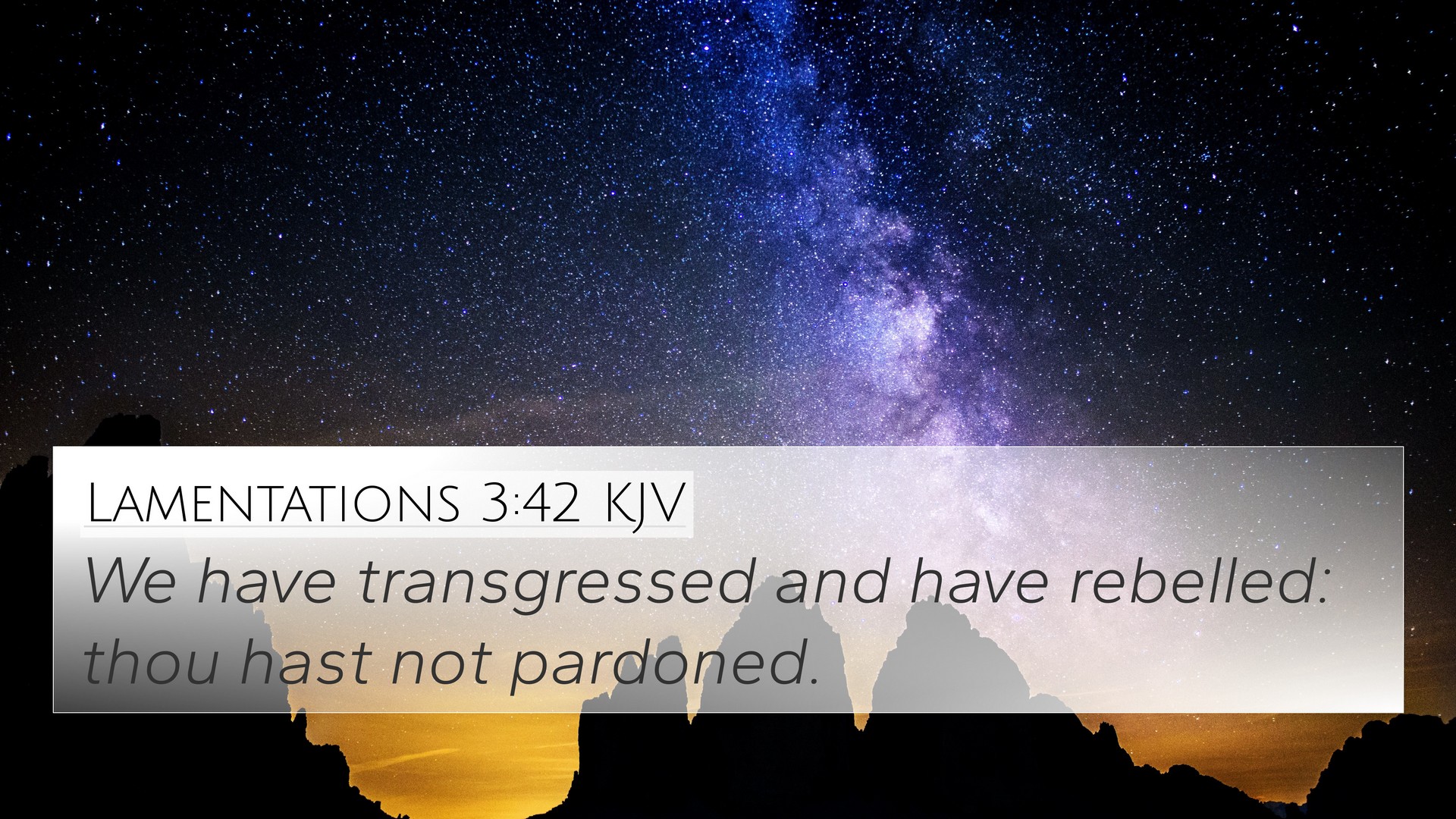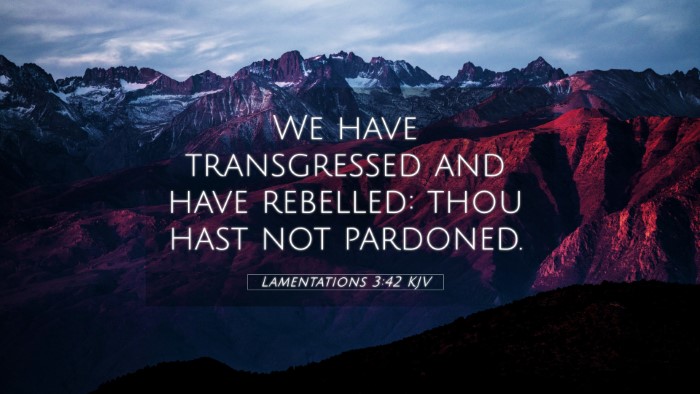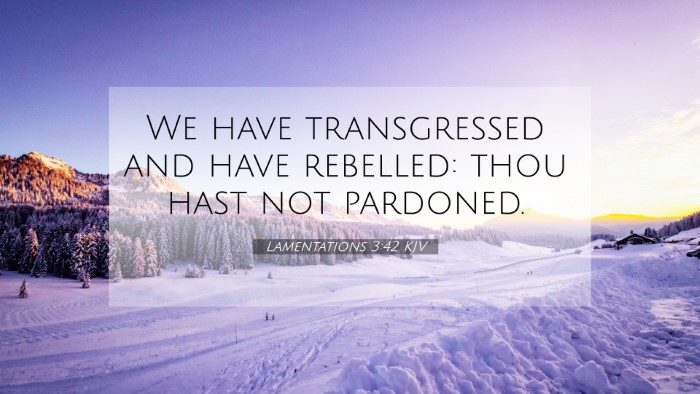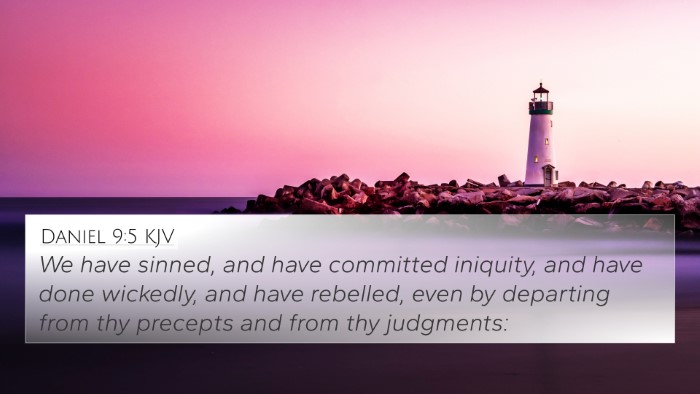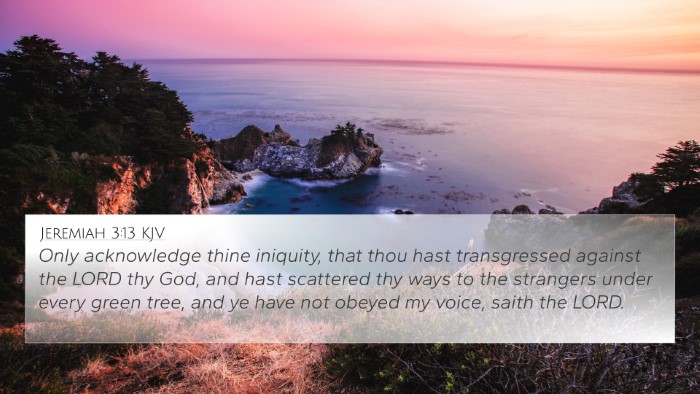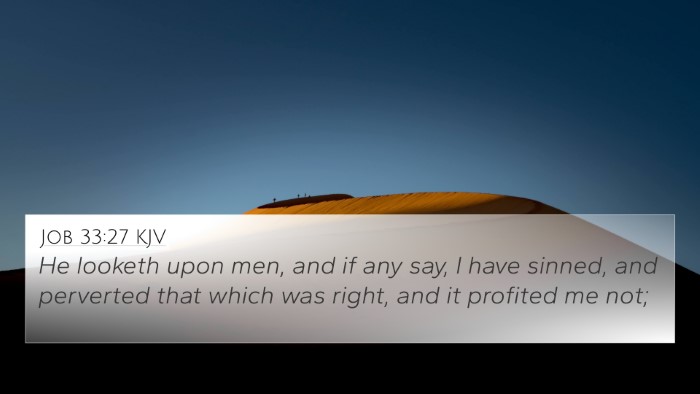Lamentations 3:42 states, "We have transgressed and have rebelled; thou hast not pardoned." This verse encapsulates a deep sense of lament and recognition of sin. The context comes from the sorrowful reflections of the Israelites during their exile, experiencing the consequences of their unfaithfulness to God. Various commentaries reveal insights into the meaning of this verse, highlighting themes of repentance, divine judgment, and the necessity for forgiveness.
Insights from Commentaries:
-
Matthew Henry: Henry emphasizes the gravity of sin by focusing on the collective transgressions of the people. He sees this acknowledgment as a crucial step towards repentance and recognizes the importance of confessing one's sins to experience God's mercy.
-
Albert Barnes: Barnes enlightens readers about the implications of rebellion against God. He notes that the verse illustrates a lack of divine pardoning in light of persistent sin, reflecting God's justice. Barnes encourages a view that leads to understanding human guilt and the need for God's grace.
-
Adam Clarke: Clarke connects this verse to the broader narrative of Israel's history, indicating a pattern of rebellion and subsequent divine punishment. He advises readers to reflect on their own lives, recognizing the necessity of seeking forgiveness sincerely.
This verse serves as a poignant reminder of the consequences of turning away from God, which resonates with multiple other biblical passages, creating a web of connections that illustrate the continuity of this theme throughout scripture. Below are notable cross-references that offer deeper insights:
- Isaiah 59:2: "But your iniquities have separated you from your God; your sins have hidden his face from you, so that he will not hear."
- Psalm 66:18: "If I had cherished sin in my heart, the Lord would not have listened."
- James 4:6: "But he gives us more grace. That is why Scripture says: 'God opposes the proud but shows favor to the humble.'
- 1 John 1:9: "If we confess our sins, he is faithful and just to forgive us our sins and to cleanse us from all unrighteousness."
- Jeremiah 14:7: "Though our sins testify against us, do something, Lord, for the sake of your name; for our offenses are many, we sin against you."
- Ezekiel 18:30: "Therefore I will judge you, Israel, each one according to their own ways, declares the Sovereign Lord. Repent! Turn away from all your offenses, so sin will not be your downfall."
- Proverbs 28:13: "Whoever conceals their sins does not prosper, but the one who confesses and renounces them finds mercy."
In summary, Lamentations 3:42 invites readers to consider the profound relationship between human sin and divine consequence. The insights from Matthew Henry, Albert Barnes, and Adam Clarke underscore the magnitude of repentance and the hope for forgiveness that resonates throughout the Bible. Each cross-reference connects back to the core theme of seeking God's mercy amid the reality of sin.
Understanding and Application: For individuals exploring the meaning of Lamentations 3:42, it serves not only as a reminder of accountability but also offers a pathway toward reconciliation with God. Engaging in cross-referencing biblical texts can enhance one's understanding of repentance and mercy, as well as the overarching themes of redemption that permeate the scriptures.
Tools for Cross-Referencing: To delve deeper into the themes of this verse and connect it with others, one might consider utilizing:
- Bible concordance for thematic searches
- Bible cross-reference guides to locate similar themes
- Cross-reference Bible study methods to draw connections
- Bible reference resources for comprehensive study
- Bible chain references that illustrate interconnections
By understanding these connections and using various study tools, readers can gain a more profound comprehension of scripture and how it interrelates, enriching both personal faith and intellectual exploration.
